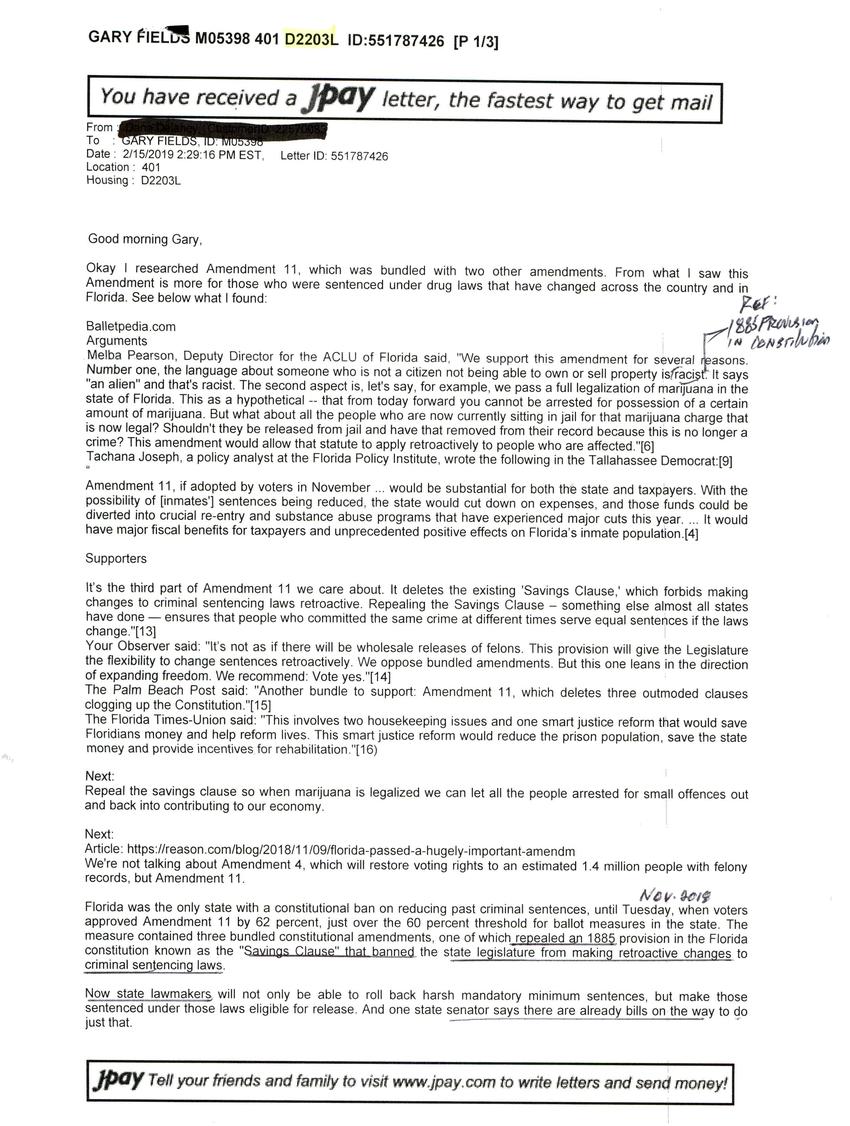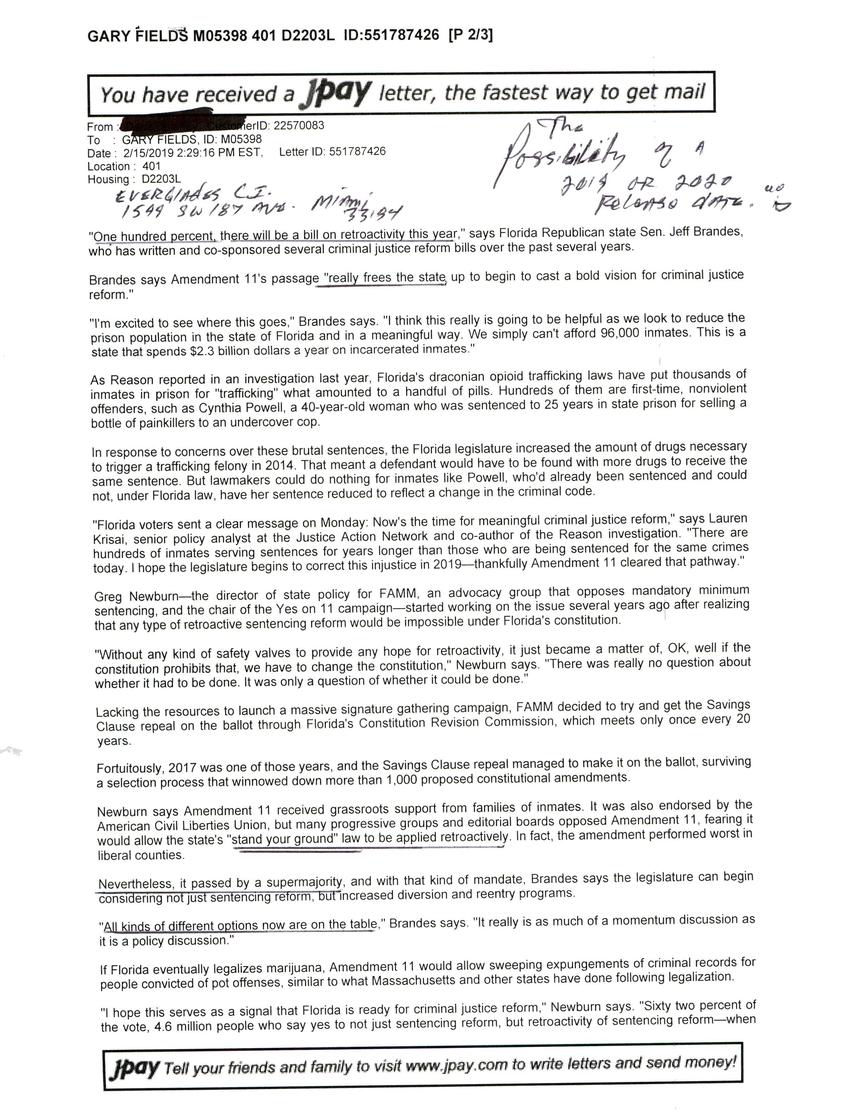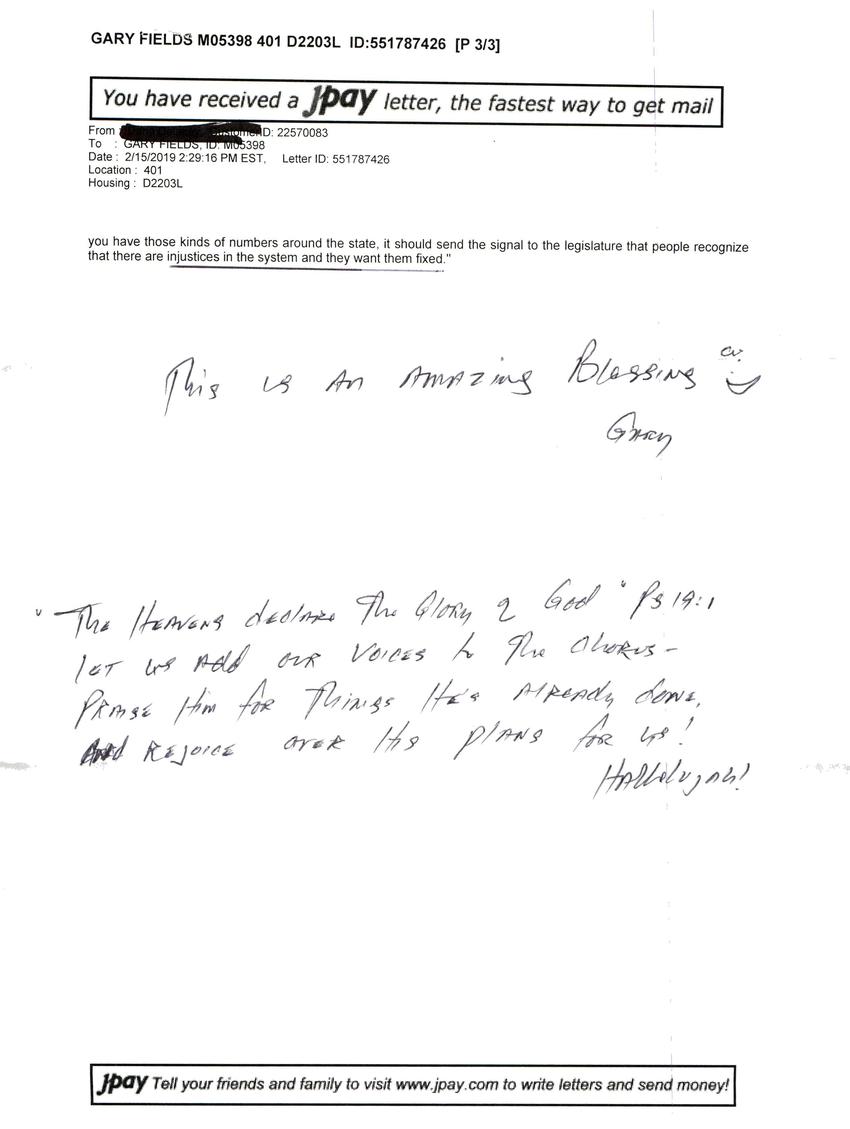
Transcription
Good morning Gary,
Okay I researched Amendment 11, which was bundled with two other amendments. From what I saw this Amendment is more for those who were sentenced under drug laws that have changed across the country and in Florida. See below what I found:
Balletpedia.com
Arguments
Melba Pearson, Deputy Director for the ACLU of Florida said, "We support this amendment for several reasons. Number one, the language about someone who is not a citizen not being able to own or sell property is racist. [ref: 1885 provision in constitution] It says "an alien" and that's racist. The second aspect is, let's say, for example, we pass a full legalization of marijuana in the state of Florida. This as a hypothetical -- that from today forward you cannot be arrested for possession of a certain amount of marijuana. But what about all the people who are now currently sitting in jail for that marijuana charge that is now legal? Shouldn't they be released from jail and have that removed from their record because this is no longer a crime? This amendment would allow that statute to apply retroactively to people who are affected." [6]
Tachana Joseph, a policy analyst at the Florida Policy Institute, wrote the following in the Tallahassee Democrat: [9]
Amendment 11, if adopted by voters in November... would be substantial for both the state and taxpayers. With the possibility of [inmates'] sentences being reduced, the state would cut down on expenses, and those funds could be diverted into crucial re-entry and substance abuse programs that have experienced major cuts this year... It would have major fiscal benefits for taxpayers and unprecedented positive effects on Florida's inmate population. [4]
Supporters
It's the third part of Amendment 11 we care about. It deletes the existing 'Savings Clause', which forbids making changes to criminal sentencing laws retroactive. Repealing the Savings Clause - something else almost all states have done - ensures that people who committed the same crime at different times serve equal sentences if the laws change." [13]
Your Observer said: "It's not as if there will be wholesale releases of felons. This provision will give the Legislature the flexibility to change sentences retroactively. We oppose bundled amendments. But this one leans in the direction of expanding freedom. We recommend: Vote yes." [14]
The Palm Beach Post said: "Another bundle to support: Amendment 11, which deletes three outmoded clauses clogging up the Constitution." [15]
The Florida Times-Union said: "This involves two housekeeping issues and one smart justice reform that would save Floridians money and help reform lives. This smart justice reform would reduce the prison population, save the state money and provide incentives for rehabilitation." [16]
Next:
Repeal the savings clause so when marijuana is legalized we can let all the people arrested for small offences out and back into contributing to our economy.
Next:
Article: https://reason.com/blog/2018/11/09/florida-passed-a-hugely-important-amendm
We're not talking about Amendment 4, which will restore voting rights to an estimated 1.4 million people with felony records, but Amendment 11.
Florida was the only state with a constitutional ban on reducing past criminal sentences, until Tuesday [Nov 2019], when voters approved Amendment 11 by 62 percent, just over the 60 percent threshold for ballot measures in the state. The measure contained three bundled constitutional amendments, one of which repealed an 1885 provision in the Florida constitution known as the "Savings Clause" that banned the state legislature from making retroactive changes to criminal sentencing laws.
Now state lawmakers will not only be able to roll back harsh mandatory minimum sentences, but make those sentenced under such laws eligible for release. And one state senator says there are already bills on the way to do just that.
[The possibility of a 2019 or 2020 release date. :D]
"One hundred percent, there will be a bill on retroactivity this year," says Florida Republican state Sen. Jeff Brandes, who has written and co-sponsored several criminal justice reform bills over the past several years.
Brandes says Amendment 11's passage "really frees the state up to begin to cast a bold vision for criminal justice reform."
"I'm excited to see where this goes," Brandes says. "I think this really is going to be helpful as we look to reduce the prison population in the state of Florida and in a meaningful way. We simply can't afford 96,000 inmates. This is a state that spends $2.3 billion dollars a year on incarcerated inmates."
As Reason reported in an investigation last year, Florida's draconian opioid trafficking laws have put thousands of inmates in prison for "trafficking" what amounted to a handful of pills. Hundreds of them are first-time, nonviolent offenders, such as Cynthia Powell, a 40-year-old woman who was sentenced to 25 years in state prison for selling a bottle of painkillers to an undercover cop.
In response to concerns over these brutal sentences, the Florida legislature increased the amount of drugs necessary to trigger a trafficking felony in 2014. That meant a defendant would have to be found with more drugs to receive the same sentence. But lawmakers could do nothing for inmates like Powell, who'd already been sentenced and could not, under Florida law, have her sentence reduced to reflect a change in the criminal code.
"Florida voters sent a clear message on Monday: Now's the time for meaningful criminal justice reform," says Lauren Krisai, senior policy analyst at the Justice Action Network and co-author of the Reason investigation. "There are hundreds of inmates serving sentences for years longer than those who are being sentenced for the same crime today. I hope the legislature begins to correct this injustice in 2019 - thankfully Amendment 11 cleared that pathway."
Greg Newburn - the director of state policy for FAMM, an advocacy group that opposes mandatory minimum sentencing, and the chair of the Yes on 11 campaign - started working on the issue several years ago after realizing that any type of retroactive sentencing reform would be impossible under Florida's constitution.
"Without any kind of safety valves to provide any hope for retroactivity, it just became a matter of, OK, well if the constitution prohibits that, we have to change the constitution," Newburn says. "There was really no question about whether it had to be done. It was only a question of whether it could be done."
Lacking the resources to launch a massive signature gathering campaign, FAMM decided to try and get the Savings Clause repeal on the ballot through Florida's Constitution Revision Commission, which meets only once every 20 years.
Fortuitously, 2017 was one of those years, and the Savings Clause repeal managed to make it on the ballot, surviving a selection process that winnowed down more than 1,000 proposed constitutional amendments.
Newburn says Amendment 11 received grassroots support from families of inmates. It was also endorsed by the American Civil Liberties Union, but many progressive groups and editorial boards opposed Amendment 11, fearing it would allow the state's "stand your ground" law to be applied retroactively. In fact, the amendment performed worst in liberal counties.
Nevertheless, it passed by a supermajority, and with that kind of mandate, Brandes says the legislature can begin considering not just sentencing reform, but increased diversion and reentry programs.
"All kinds of different options now are on the table," Brandes says. "It really is as much of a momentum discussion as it is a policy discussion."
If Florida eventually legalizes marijuana, Amendment 11 would allow sweeping expungements of criminal records for people convicted of pot offenses, similar to what Massachusetts and other states have done following legalization.
"I hope this serves as a signal that Florida is ready for criminal justice reform," Newburn says. "Sixty two percent of the vote, 4.6 million people who say yes to not just sentencing reform, but retroactivity of sentencing reform - when you have those kinds of numbers around the state, it should send the signal to the legislature that people recognize that there are injustices in the system and they want them fixed."
This is an amazing blessing. :D
Gary
"The heavens declare the glory 2 God" Ps 19:1
Let us add our voices to the chorus - praise Him for things He's already done, and rejoice over His plans for us!
Hallelujah!
Other posts by this author
|
2021 jul 3

|
2021 mar 7

|
2021 mar 3

|
2021 jan 31

|
2020 nov 19

|
2020 oct 29

|
More... |




Replies